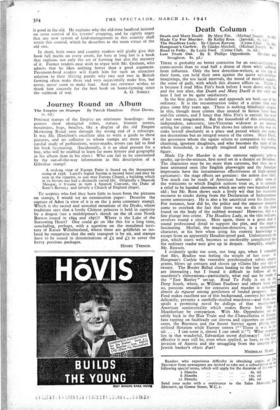Death Column .
Stoughton. 8s. 3d.)
THERE is probably no better corrective for an over-addiction to crime-novels than to read half a dozen of them while suffering from influenza. Only the best detection-writers, at the top of their form, can hold their own against the queer sub-delirious imaginings, the too lucid intervals, the mood of morbid squalor, the sense of guilt, with which this disease afflicts us. Maybe it is because I read Miss Fitt's book before I went down with 'flu and the rest after, that Death and Mary Dazill is the only one here I feel to be quite satisfactory.
In the first place, its subject and approach are both out of the ordinary. It is the reconstruction today of a crime that took place some fifty years ago. There is nothing blindingly original in this, though most crimes thus treated in fiction have been real-life crimes, and I fancy that Miss Fitt's is entirely the work of her own imagination. But the household of this comfortable, independent, autocratic, late-Victorian widower is an unusual setting for crime: and Miss Fitt shows her talents in the way she sinks herself absolutely in a place and period which she makes not decorations but an integral source of the crime. Mary Dazill, the governess whom the squire selects to companion his nubile, charming, ignorant daughters, and who becomes the ruin of the whole household, is a deeply imagined and really frightening figure.
Made Up For Murder is at the extreme opposite pole—a sparky, up-to-the-minute, first novel set in a theatre on Broadway. The characters may be no more than cartoons, but they are at least animated ones (the English playwright and the American impresario have the instantaneous effectiveness of high-spirited caricature): the stage effects are genuine: the action does thrill Too much can be made of American humour : after some of the witticisms to which English authors treat us, it is certainly a relief to be handed chestnuts which are only two hundred years old ; but Mr. Roos shows such a lively wit that his occasional recourse to cracks dating from the Declaration of Independence seems unnecessary. He is also a bit uncritical over his detection. For instance, how did he, the police and the amateur detective come to overlook the fact that there was no slit in the cloak found on the body of the stabbed woman? However, this is a fine plunge into crime. The Headless Lady, as the title indicates, revolves round a circus. Here again, there is a great deal of sound professional detail to support the plot, and the argot is fascinating. Merlini, the magician-detective, is a sympathetic character, at his best when using his esoteric knowledge to escape from an apparently Houdini-proof gaol. Unfortunately the plot, which starts well, becomes so intolerably complicated that the ordinary reader may give, up in despair. Simplify, simplify, Mr. Rawson.
I evidently spoke too soon, not long ago, when I remarked that Mrs. Bradley was feeling the weight of her years. In Hangman's Curfew the venerable psychoanalyst solves crypto- grams, blows up cottages and shoots up villains like any chit or twenty. The Border Ballad clues leading to the lost inheritance are interesting; but I found it difficult to follow all the murderer's elaborations—particularly, what real use he made ei the " East Bierley " set-up. Road To Folly is set in she Deep South, where, as William Faulkner and others have told us, passions smoulder for centuries and murder is considered almost de rigueur among gentlemen of landed property. Miss Ford makes excellent use of this background, conveys her motives delicately, presents a carefully-studied murderee—and then, alas, spoils a promising novel by dollops of that mushy-sweet American sentimentality which makes Barrie look like dt Montherlant by comparison. With Mr. Oppenheim we are safely back in the Blue Train and the ,Chancelleries of Eurofe; fans tapping on faultlessly cut sleeves and cigarettes on iewelled . cases, the Baroness and the Secret Service agent plying the' stylised flirtation while Europe totters (" ` There is war in she air. . . . I can scent it, almost I can smell it.' ") 'What nostatil lies in that wonderful, Edwardian Secret diplomacy ! And how, effective it may still be, even when applied, as here, to the 14° invasion of Austria and the smuggling from the country of Jewish banker's objets d'art!
NICHOLAS Bt.






































 Previous page
Previous page